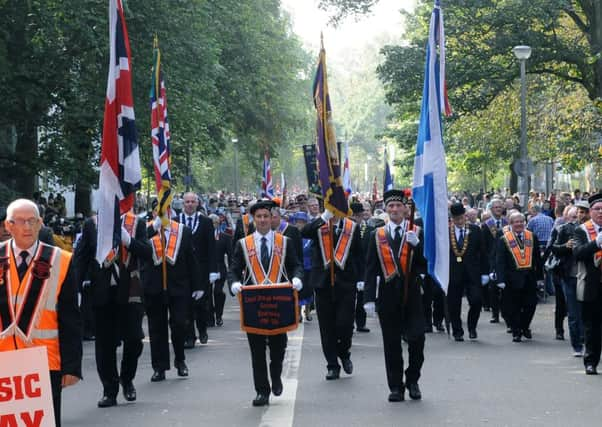Scottish Orange Order lifts ban on members at Catholic ceremonies


A spokesman for the Grand Orange Lodge of Scotland said he was not prepared to “discuss the internal business” of the organisation, but it appears the decision was taken in recent weeks with the new policy later circulated to the various lodges.
Although the centuries-old rule states that members of the order “should not countenance by your presence” any act or ceremony of Catholic worship, many Orangemen and Orangewomen attend Catholic funerals with no record of any complaints or censure.
Advertisement
Hide AdAdvertisement
Hide AdThe controversial rule came under the spotlight in 2011 following the murder of Ronan Kerr – when high-profile Orange Order members Tom Elliott and Danny Kennedy attended the PSNI constable’s funeral mass.
An official complaint led to an internal disciplinary hearing being convened but no action was taken against the two Ulster Unionist politicians.
At the time, a spokesman for the Grand Orange Lodge of Ireland said: “It is important that the Kerr family know they have widespread support throughout the community and the Orange Order offers sincere sympathy to them on the loss of their brave son.”
Speaking to the News Letter yesterday, Mr Elliott said he did not wish to comment on the decision taken in Scotland, but said the time might be right for a similar discussion on this side of the Irish Sea.
Advertisement
Hide AdAdvertisement
Hide Ad“I would welcome a discussion within Orangeism locally but that is a matter for them,” he said.
According to a report in Glasgow’s Evening Times, one Glasgow lodge member said the announcement received “a mixed response” with some strongly against any change.
The member, who did not wish to be named, said: “The change was rushed through two months ago. Some of the membership are up in arms. There was an argument about it and it could have a drastic affect on the organisation.
“I fully support the move – we are all one society now.”
Dr Michael Rosie, of the University of Edinburgh, has expressed his surprise at the move, but doesn’t believe it will have much of an impact on the membership.
Advertisement
Hide AdAdvertisement
Hide Ad“From what I understand there is a strong majority who said it was time for the ban to go,” he said.
“I thought it would take a generational change but clearly this has already happened.”
Dr Rosie said many people were uncomfortable with a rule seen as promoting an anti-Catholic message rather than a pro-Protestant one.
“There will be many members, perhaps the more traditional, who will not be comfortable,” he said.
Advertisement
Hide AdAdvertisement
Hide Ad“I think it is a good move, a sensible move, but there will be traditionalists who will remain suspicious,” Dr Rosie added.
In 2014 the Fermanagh branch of the order published the results on an internal survey which showed 49.7% of members in favour of lifting the ban, with 25.3% against and 25% having no strong opinion.
A spokesman for the Scottish grand lodge said: “We don’t discuss our internal affairs with the media.”
A Grand Orange Lodge of Ireland spokesman declined to comment on whether they had any plans to propose a similar rule change.
He said: “This is a matter for the Grand Lodge of Scotland. We have no further comment to make.”